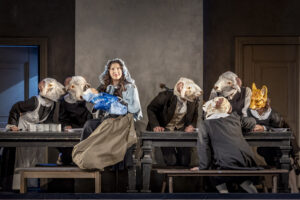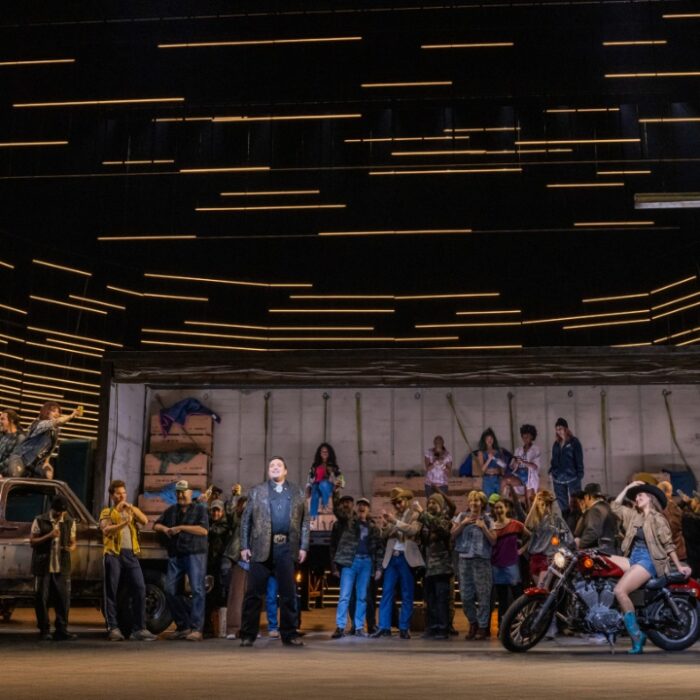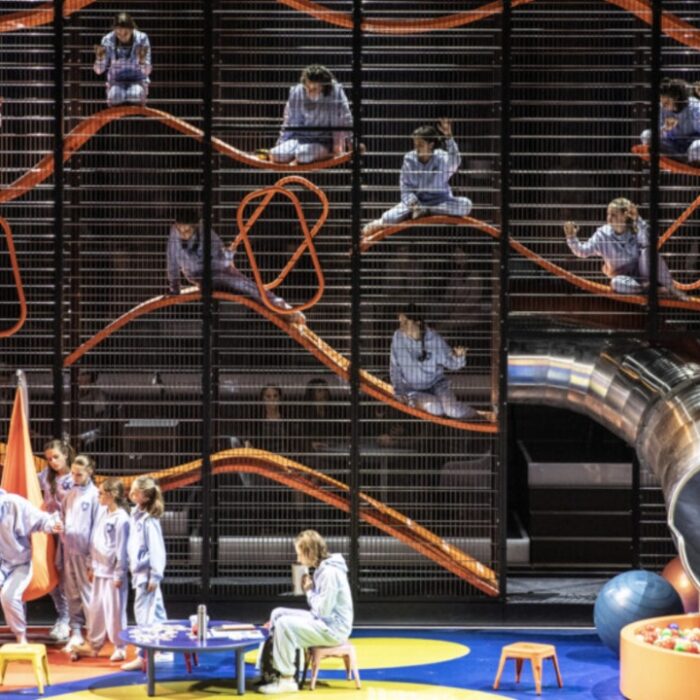
Innsbruck Early Music Festival 2025 Review: Il Giustino
Excellent Performances From A Young Cast Led By Musical Director Stefano Demicheli
By Alan Neilson(Photo: Birgit Gufler)
Each year, the Innsbruck Early Music Festival presents its Oper: Jung, an opera performed by singers in the early stages of their careers, who recently made strong impressions at the festival’s Cesti competition. It is an event that rarely disappoints. Not only are the productions of a very high standard, but it is also exciting to watch and listen to the possible stars of tomorrow. There is always at least one or two standouts, who could easily slip into a production of a top opera company, and almost all the cast show the potential for achieving a successful career.
This year’s chosen opera was Vivaldi’s “Il Giustino,” a work first staged in 1724 at Rome’s Teatro Capranica. A typical example of the early 18th-century baroque, its convoluted narrative is taken from antiquity, in which the human and mythical worlds interact and allow for fabulous vocal displays from the soloists. In this case, the plot is superficially based on the rise of the Byzantine emperor, Giustino, who started life as a swineherd and ended up as one of the most powerful men alive. The libretto, written by Antonio Maria Lucchini, based upon earlier libretti by Nicolò Beregan and Pietro Pariati, bears little resemblance to reality but focuses on fictional power struggles and love interests of the various characters within the opera, in which Giustino shows nothing but loyalty to the emperor, Anastasio, but who is, nevertheless, destined for power, which was related to him in a dream when he was tending to pigs as a young man.
Peragallo’s Imaginative & Layered Interpretation
It is very much a rags-to-riches story that would not seem out of place in a child’s book of fairy tales, with even a passing similarity to the story of Cinderella, something the director, Claudia Isabel Martin Peragallo, was happy to allude to in her production. The opening scene is set as a celebratory banquet, in which Giustino appears as one of the servants and is of no importance to the guests. In the final scene, the table is set for another banquet, but this time Giustino is now seated at its head as co-emperor along with Anastasio. The villains, Andronico, Vitaliano, Polidarte, and Amanzio, take up sinister poses and slink around in the shadows with evil intent. The goddess Fortuna acted out the part as if she were Giustino’s fairy godmother; all that was missing was a magic wand. Often, the stage was given a slightly comic book appearance, such as when Giustino and a forlorn-looking Anastasio, with a lifebelt around his neck, were shipwrecked. Humans with animal heads populated certain scenes, no doubt referencing Giustino’s life as a farmer. There was even a large book that was consulted by the characters, which was possibly a book of fairy tales. It was a simple, effective reading, but it did not end there.
Peragallo offered another interpretation alongside the idea of a fairy tale, in which the goddess Fortune opened up the possibility for Giustino to alter his destiny by offering him a vision of what could be in a dream, which acted as his motivation to achieve something great; it unshackled his ambition and allowed him to shape his own future. Thus, the stage became a fusion of reality, dreams, and fairy tales and offered the audience a variety of simultaneous interpretations. The sea monster that Giustino slays can, therefore, be taken as real, a fiction, a dream, or a metaphor; it does not matter what it is, but Giustino has to slay it to achieve his goals.
The sets, designed by Polina Liefers, were simple yet versatile, consisting of decorative flats that acted as framing devices with three rectangular blocks that could be moved and rotated with ease to alter the location, perspective, and ambience. Props did not form a major part of the staging and were restricted to the essentials, such as tables and chairs for the banquets. A large clock appeared in the centre of the stage, in which the hands moved backwards and forwards to signify changing time periods. It was a staging that was uncluttered but with enough detail to carry the drama and with sufficient visual interest to maintain the audience’s attention.
Liefers was also responsible for the costume designs, which she modeled on the Victorian period, an era like the baroque, which ‘shared a strong interest in magic, transformation and escapism’ thereby blurring the boundaries between ‘fantasy and reality.’ While such a connection certainly exists, it is difficult to think of a period in which such themes were not explored. Moreover, it did little to flesh out the meaning of the work, which was perfectly clear. The costumes, however, were not at all disruptive and sat comfortably within the overall production.
The musical director, Stefano Demicheli, oversaw an excellent performance from the Barockorchester: Jung, from which he elicited a rhythmically strong and energetic interpretation with a pleasing sense of balance, neatly fashioned to meet the dramatic needs of the staging. He was particularly attentive to the needs of the young cast, from whom he encouraged some excellent performances.
A Young Talented Cast Turns In A Quality Performance
Although Giustino has fewer set-piece numbers than some of the other characters, contralto Justina Vaitkute’s forceful and engaging characterization ensured that the hero was not allowed to be pushed into the background. Her recitatives were lively, sensitively accented to promote the text and dramatically strong, while her arias, underpinned by a solid technique, were carefully crafted to bring out their emotional qualities. In Act one, scene four, for example, Giustino bemoans his life as a farmer and his desire to experience the field of battle, for which Viatkute beautifully captured the sense of longing. In a further example in Act two, scene 13, Giustino reflects on his love of danger and his inability to feel fear in the aria “Ho nel petto un cor si forte,” for which she sensitively depicted his heroic character while showing off her ability to ornament and color the vocal line.
With the increased popularity of baroque opera over the past couple of decades or so, there have emerged many excellent countertenors availing themselves of the opportunities to fill the roles once sung by the castrati. A recent addition to this group is Maximiliano Danta, who won last year’s Cesti competition and, for this production, was cast in the role of Emperor Anastasio. His singing possesses an alluring, homogeneous tone with flexibility, control, and lyrical expressivity that he uses imaginatively to relate the meaning of the text and to embellish the vocal line. Aria after aria was delivered with an impressive interpretive depth and attention to detail, yet never at the expense of the beauty of the piece. It was a truly delightful performance.
Soprano Jiayu Jin immersed herself fully into the role of Arianna, the wife of Emperor Anastasio, who, through no fault of her own, finds herself at the center of the drama as she is pursued relentlessly by Vitaliano, who is prepared to have her killed rather than give up on her. She is even sentenced to death by her own husband, who wrongly believes she is in love with Giustino. Unsurprisingly, therefore, she is given several powerful arias to sing, to which she brought depth and beauty. Her aria “Per noi soave, e bella,” which she sings following her escape from the sea monster, perfectly illustrated her vocal versatility, wonderful phrasing and ability to decorate the line, while the aria “Augelletti,” in which she was supported by only a delicate, quiet accompaniment, allowed the graceful beauty of the voice and her ability to carry the melody to shine. Recitatives were equally well delivered.
Unfortunately, just before the curtain went up, it was announced that soprano Sarah Hayashi, playing the roles of Anastasio’s sister, Leocasta, and the goddess Fortuna, was suffering from a sore throat. Despite this, she still managed to make a fine impression. Recitatives were expressively delivered, and her arias had much to admire, displaying versatility, careful phrasing, an attractive upper register, and a neatly crafted coloratura. Her first aria was Fortuna’s “Del tua forte,” for which she gave an engaging, secure, and attractive performance, immediately driving away any thoughts that her singing might be severely compromised. There was the occasional sign of discomfort, which was to be expected in the circumstances, but it did little to detract from her performance.
Tenor Thoma Jaron-Wutz produced a strong performance in the role of Vitaliano. He possesses a lyrically distinctive, versatile, and expressive voice, which he used successfully to develop his character. Although he favored force and bold phrasing at the expense of delicacy, he certainly captured the swagger and confidence of the aggressive tyrant. Recitatives were colorful, emotional, and delivered with an energetic clout, while his arias were both pleasing on the ear and expressively compelling, as exemplified in his Act three aria, “Il piacer della vendetta,” in which he showed off his vocal versatility, confident coloratura, and ability in accenting the line, all with the bravado of an anti-hero. He was also particularly attentive to the text.
Mezzosoprano Lucija Varšić, playing Vitaliano’s brother, Andronico, convincingly traversed the requirements of the role, as she donned the disguise of a woman and hung around in the shadows. Her singing was clear, articulate, and correct, if somewhat conservative. Her two arias were both given solid renditions, but failed to generate much in the way of an emotional response from the audience. To be fair, they were not the most exciting of arias, but a more adventurous approach would have allowed her to show off her talent in a better light.
Soprano Benedetta Zanotto did not start too impressively in the role of the sly Amanzio. Her aria, “La gloria del mio sangue,” was not particularly convincing; her projection was weak, and she did not bring the text alive, although her trilling and coloratura definitely displayed promise. By Act three, however, in which she had two arias to sing, she had turned the situation around. There was now more confidence and freedom in her singing. The aria, “Si, vò a regnar,” was given a fresh, bright presentation that caught the attention, which she followed with a beautiful rendition of the aria “Or che cinto ho il crin d’allor,” in which she showed off her vocal versatility, expressivity, and solid technique to good effect, and in which her wonderful coloratura shone.
Tenor Massimo Frigato, cast in the relatively small role of Polidarte, had only one aria to sing, but he certainly made the most of the opportunity. Hovering around the edges, he cut a sinister figure, who was clearly not meant to be attractive or sympathetic in any possible way. If there was any doubt, he was also portrayed as particularly vulgar, not averse to urinating against the scenery and drinking beer from a bottle. His delivery of recitatives and his aria “Ritrosa bellezza” were neatly presented with a threatening menace.
Overall, the production proved to be another successful Oper: Jung presentation.



